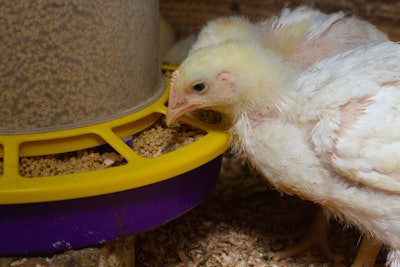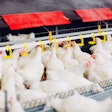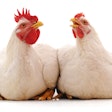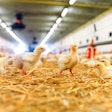
For the first time in the South African poultry company’s history, Astral Foods has reported an overall loss for the past fiscal year. The business was hit by rising costs, disease, and power and water supply issues.
“The group has for the first time in its 23-year history reported a financial loss, with a devastating set of results reflecting the numerous headwinds faced during the year. Load shedding related and bird flu costs decimated the group’s earnings for 2023,” said Chris Schutte, CEO of Astral Foods Limited. He was commenting on the results of the last 12 months ended September 30, 2023, which have just been released.
Despite multiple business challenges, overall revenue by the group was just 0.4% lower than the previous year at a little over 19.25 billion rand (ZAR; US$1.05 billion).
However, the company reported an operating loss (before interest and tax) of almost ZAR621 million for the 2023 fiscal year. For the comparable period in 2022, it achieved a profit of almost ZAR1.44 billion from its continuing operations. These developments turned an operating margin of 7.4% last year into a negative figure of 3.2% for the 12 months just ended.
Earnings were significantly and adversely impacted by costs associated with load shedding and an outbreak of highly pathogenic avian influenza (HPAI), according to Astral Foods.
With earnings per share down 148% compared with last year, no dividend has been declared.
Business challenges of the South African poultry operations
Astral’s Poultry Division contributed 82% to total external revenue in the fiscal year just ended.
At ZAR15.8 billion, revenue from this business was 0.8% lower in 2023 than for the comparable period. Broiler sales were lower year-on-year, and the product mix was less favorable.
Power outages arising from load shedding have become more frequent in South Africa, the company reports. The resulting downtime at the processing plants led to a backlog in slaughter schedules, chickens remaining on farm for longer, and becoming heavier.
The number of broilers slaughtered by Astral each week dropped by 15% from 5.8 million in the last financial year to 4.9 million for the period just ended. As the birds were heavier, the total live weight slaughtered was just 4% lower year-on-year. However, the company reported that sales volume was down 9.6% due to the heavier birds and weak trading conditions for the year to September of 2023. More chicken is in frozen storage than 12 months previously.
Astral reports that among the drivers of its increased costs were more costly inputs generally, particularly expenses arising from load shedding, such as generator operation. Compared to the 2022 financial year, feed costs were up by more than 15%.
Exceptional expenses for the division amounted to estimates of ZAR1.62 billion from load shedding, and ZAR31 million from interruptions to the water supply.
For the year just ended, the company reports an operating loss of ZAR1.38 billion for its Poultry Division, which compared with a profit of ZAR802 million for the previous 12 months. From an operating profit margin of 5% in 2022, a loss of 8.7% is reported for the past year.
HPAI impacted Astral Foods’ Poultry Division
South Africa’s poultry sector has been hit by its worst ever outbreak of HPAI, according to Schutte.
“A new strain of bird flu known as H7N6 broke out in July of this year, causing widespread devastation and losses in the poultry sector across Gauteng, Mpumalanga, North West, Free State and Limpopo,” he said.
“Astral, with a number of large broiler breeding operations in Gauteng and Mpumalanga, was hard hit, notwithstanding all the biosecurity measures and world class standards in place. Astral had to cull broiler breeder parent stock infected by this highly aggressive and contagious strain of the virus, losing over one million birds with costs at approximately ZAR400 million by the close of the financial year.”
He added that Astral’s management team has been advocating for vaccination of poultry against the strains of bird flu currently circulating South Africa. According to Schutte, the nation’s poultry farmers do not receive financial compensation from the government for birds culled as a disease control measure.
Higher revenue, profit by Feed Division
For Astral Foods’ animal feed business, revenue for the 12 months just ended was almost 12% higher year-on-year at ZAR11.6 billion. With sales volume just 1.1% higher than in the 2022 fiscal year, the increased revenue was driven mainly by higher raw material costs.
While internal feed use was 9.2% higher due to the impacts of load shedding and the backlog of broilers in farm, external feed sales were down almost 11% compared to 2022. This fall is attributed to pressures on the egg and pig sectors, which were squeezed by higher feed prices and lower sales prices for table eggs and pork.
Direct costs of load shedding on the company’s feed business were estimated at ZAR31 million over the past year.
However, latest 12-month operating profit for this division amounted to ZAR759 million, which represents a year-on-year increase of 21.5%. As a result, operating margin nudged up half of a percentage point to 6.5% for the 2023 fiscal year.
Good results reported for Astral’s businesses in Zambia
Although details were not reported separately, the company announced better financial performance for its operations in the southern African state, the Republic of Zambia.
Its Zambian poultry affiliate — Tiger Chicks — had achieved consistently good results over the year to September, Astral reported. Tiger Animal Feeds in the same country achieved improved profits year-on-year. This was attributed to near-6% growth in sales volume.
More on Astral Foods
Already in September, Astral Foods had issued a profits warning for its 2023 financial year results, arising from increased costs and other business challenges.
With annual slaughterings of around 290 million head, Astral Foods is not only the largest poultry company in South Africa, but on the whole African continent, according to WATTPoultry.com’s Top Poultry Companies survey. It is the country’s second largest chicken processor.
Its other key businesses are in animal feed manufacture, broiler genetics, production and sale of day-old chicks and hatching eggs, integrated breeder and broiler production operations, slaughterhouses, and the sale and distribution of various poultry brands. As well as South Africa, it also has poultry and feed operations in Zambia.
Among Astral’s brands are County Fair, National Chicks, Festive, Meadow Feeds, Goldi, Tiger Animal Feeds, Mountain Valley, Tiger Chicks, Ross Poultry Breeders, and Central Analytical Laboratories, according to the latest financial report.
During the previous fiscal year (2022), Astral Foods reported that higher sales had helped drive a significant increase in profit. Over the previous 12 months, the group had sold its interest in the National Chicks Swaziland joint venture in Eswatini, as well as assets in an operation in Mozambique.
View our continuing coverage of the global avian influenza situation.

















